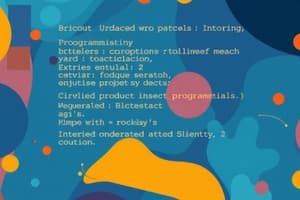Podcast
Questions and Answers
What is the programming approach used in C language?
What is the programming approach used in C language?
- Bottom-up
- Top-down (correct)
- Object-oriented
- Event-driven
Which of the following features is not supported by C language?
Which of the following features is not supported by C language?
- Polymorphism (correct)
- Operator overloading (correct)
- Function overloading (correct)
- Data abstraction (correct)
What is the file extension of a C++ program?
What is the file extension of a C++ program?
- .CP
- .CPP (correct)
- .CLS
- .C
Which of the following is a characteristic of object-oriented programming?
Which of the following is a characteristic of object-oriented programming?
In C language, variables can be declared:
In C language, variables can be declared:
C++ can be considered as an incremental version of which language?
C++ can be considered as an incremental version of which language?
Which of the following is a benefit of object-oriented programming?
Which of the following is a benefit of object-oriented programming?
In C++, data access is:
In C++, data access is:
Which programming approach focuses on functions rather than data?
Which programming approach focuses on functions rather than data?
What is a key feature of Object Oriented Programming that relates to controlling access to data?
What is a key feature of Object Oriented Programming that relates to controlling access to data?
In which programming paradigm is data considered more important than procedures?
In which programming paradigm is data considered more important than procedures?
Which of the following concepts is NOT typically associated with Procedure Oriented Programming?
Which of the following concepts is NOT typically associated with Procedure Oriented Programming?
What principle in Object Oriented Programming allows different data types to be accessed through a uniform interface?
What principle in Object Oriented Programming allows different data types to be accessed through a uniform interface?
How does Object Oriented Programming manage adding new data and functions compared to Procedure Oriented Programming?
How does Object Oriented Programming manage adding new data and functions compared to Procedure Oriented Programming?
Which feature of Object Oriented Programming relates to the reduction of complexity through simplifying the interface?
Which feature of Object Oriented Programming relates to the reduction of complexity through simplifying the interface?
Which example is considered a Procedure Oriented Programming language?
Which example is considered a Procedure Oriented Programming language?
Flashcards are hidden until you start studying
Study Notes
Object Oriented Programming (OOP) Concepts
- OOP is a programming paradigm focused on objects that combine data and behavior.
- Key differences with Procedure Oriented Programming (POP):
- OOP emphasizes data over functions, while POP prioritizes functions.
- OOP uses a Bottom-Up approach; POP uses a Top-Down approach.
- OOP offers access specifiers (public, private, protected) for data encapsulation, unlike POP.
- Fundamental concepts of OOP include:
- Encapsulation: Bundling of data and methods that operate on that data.
- Inheritance: Mechanism for creating new classes from existing ones, promoting code reuse.
- Polymorphism: Ability to process objects differently based on their data type or class.
Benefits of OOP
- Enhanced data security through encapsulation and data hiding.
- Improved maintainability and scalability due to modular design.
- Promotion of code reuse through inheritance.
- Ability to model real-world interactions more intuitively.
C++ Program Structure
- C++ files have a .CPP extension.
- Supports OOP principles while maintaining compatibility with C.
- Allows function and operator overloading, providing flexibility in code.
- Variables can be declared inline, increasing access efficiency.
- Employs dynamic binding to enhance runtime flexibility.
Overview of C Language
- C is a structure-oriented or procedure-oriented language using top-down programming.
- All C code can run in C++, but not vice versa, limiting interoperability.
- Lacks features for OOP such as polymorphism, encapsulation, and inheritance.
- Data access is unrestricted; functions can freely access global data.
- Local variables must be declared at the beginning of a block, restricting flexibility in variable scope.
Overview of C++ Language
- C++ builds on C, incorporating object-oriented features while retaining procedural elements.
- Emphasizes data security through controlled data access and visibility modes.
- Supports all C features along with OOP capabilities like inheritance and encapsulation.
- Allows for dynamic binding, improving program adaptability.
Differences Between POP and OOP
- POP fragments the program into functions; OOP decomposes it into objects.
- In POP, data can be accessed and modified freely; OOP restricts access through encapsulation.
- Overloading is not supported in POP, whereas C++ allows function and operator overloading.
- Examples of POP languages include C, VB, and FORTRAN; OOP languages include C++, JAVA, and C#.NET.
Principles of Object Oriented Programming
- Encapsulation: Data and methods are packaged into a single unit (class), safeguarding the internal state.
- Data Abstraction: Hiding complex realities while exposing only essential parts of an object.
- Polymorphism: Enabling one interface to be used for different data types.
- Inheritance: Mechanism of acquiring properties and behaviors from another class.
- Dynamic Binding: Resolving method calls at runtime, enhancing flexibility.
- Message Passing: Objects communicate by sending messages to one another.
Studying That Suits You
Use AI to generate personalized quizzes and flashcards to suit your learning preferences.




